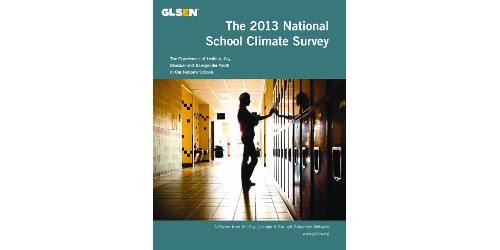
NEW YORK – GLSEN (the Gay, Lesbian & Straight Education Network) released its biennial National School Climate Survey report Oct. 22, which shows how ongoing hostile school climates impact the safety and mental health of LGBT students, as well as their educational outcomes.
"Progress is being made in our nation's schools," said Dr. Eliza Byard, GLSEN's executive director. "But when more than half of LGBT youth continue to report unsafe or even dangerous school climates, we all have a responsibility to act."
This latest edition of GLSEN's National School Climate Survey, which first began in 1999 and remains one of the few studies to examine the middle and high school experiences of LGBT youth nationally, includes four major findings:
Schools nationwide are hostile environments for a distressing number of LGBT students. Seventy-four percent were verbally harassed in the past year because of their sexual orientation and 55 percent because of their gender expression. As a result of feeling unsafe or uncomfortable, 30 percent missed at least one day of school in the past month.
A hostile school climate affects students' academic success and mental health. LGBT students who experience victimization and discrimination at school have worse educational outcomes and poorer psychological well-being. Grade point averages for these students were between nine and 15 percent lower than for others.
Students with LGBT-related resources and supports report better school experiences and academic success. LGBT students in schools with an LGBT-inclusive curriculum were less likely to feel unsafe because of their sexual orientation (35 percent vs. 60 percent). Unfortunately, only 19 percent of LGBT students were taught positive representations about LGBT people, history or events.
School climate for LGBT students has improved somewhat over the years, yet remains quite hostile for many. Increases in the availability of many LGBT-related school resources, due in part to efforts by GLSEN and other safe school advocates, may be having a positive effect on the school environment. LGBT students reported a lower incidence of homophobic remarks than ever before – from over 80 percent hearing these remarks regularly in 2001 to about 60 percent now.
"GLSEN's biennial survey allows us to understand the ever-changing landscape that is the education system for LGBT students," said Dr. Joseph G. Kosciw, GLSEN's Chief Research & Strategy Officer. "This most recent report shows that there has been progress in improving the school experience for LGBT students and that positive LGBT resources in school can make a difference in the lives of these youth."
In addition to the impact GLSEN campaigns and programs like ThinkB4YouSpeak, Ally Week, Day of Silence and No Name-Calling Week have had on improving school climates, GLSEN's Safe Space Kit, its flagship resource for educators, provides concrete strategies to educate school personnel and students about how to eliminate anti-LGBT bias. Earlier this year, GLSEN completed sending over 60,000 Safe Space Kits, reaching every middle and high school in the country.
Other key findings in the new survey include:
Thirty-six percent of LGBT students were physically harassed (e.g., pushed or shoved) in the past year because of their sexual orientation and 23 percent because of their gender expression, while 17 percent were physically assaulted (e.g., punched, kicked, injured with a weapon) in the past year because of their sexual orientation and 11 percent because of their gender expression.
Sixty-five percent of LGBT students heard homophobic remarks (e.g., "dyke" or "faggot") frequently or often. Thirty-three percent heard negative remarks specifically about transgender people, like "tranny" or "he/she," frequently or often.
Fifty-six percent of LGBT students reported personally experiencing LGBT-related discriminatory policies or practices at school and 65 percent said other students at their school had experienced these policies and practices. This included 28 percent reporting being disciplined for public displays of affection that were not disciplined among non-LGBT students.
LGBT students with 11 or more supportive staff at their school were less likely to feel unsafe than students with no supportive staff (36 percent vs. 74 percent) and had higher GPAs (3.3. vs. 2.8). Unfortunately, only 39 percent of students could identify 11 or more supportive staff.
Verbal and physical harassment based on sexual orientation and gender expression were lower than in all prior years of the NSCS, and physical assault has been decreasing since 2007.
An executive summary and the complete GLSEN National School Climate Survey report can be found at http://www.glsen.org/nscs, along with shareable infographics.









